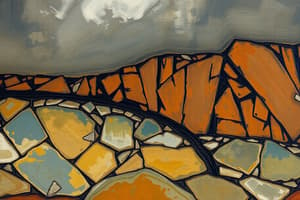Podcast
Questions and Answers
If a sandstone contains pieces of basalt, then the sandstone is younger than the basalt according to which principle?
If a sandstone contains pieces of basalt, then the sandstone is younger than the basalt according to which principle?
principle of inclusions
What does uniformitarianism mean?
What does uniformitarianism mean?
geologic processes that operate today operated in the past at about the same speed
Footprints, feeding traces, burrows, and dung are considered to be what type of fossils?
Footprints, feeding traces, burrows, and dung are considered to be what type of fossils?
trace fossils
An organism is most likely to be fossilized if it dies in what type of environment?
An organism is most likely to be fossilized if it dies in what type of environment?
Geologists estimate that the Earth is approximately how many billion years old?
Geologists estimate that the Earth is approximately how many billion years old?
If all Earth's history were equated to one calendar year, humanity would appear at what time?
If all Earth's history were equated to one calendar year, humanity would appear at what time?
The beginning and end points of eras, epochs, and periods on the geologic time scale are set by __________ ages.
The beginning and end points of eras, epochs, and periods on the geologic time scale are set by __________ ages.
The geologic time scale is broken into a series of eras, epochs, and periods based mainly on __________ dating.
The geologic time scale is broken into a series of eras, epochs, and periods based mainly on __________ dating.
Within the world's sedimentary rocks, fossils occur in what kind of sequence?
Within the world's sedimentary rocks, fossils occur in what kind of sequence?
What can be said about two formations if a geologist finds dinosaur bones in South Dakota and another finds different dinosaur bones in China?
What can be said about two formations if a geologist finds dinosaur bones in South Dakota and another finds different dinosaur bones in China?
In an undisturbed sequence of sedimentary rocks, which principle states that younger layers overlie older layers?
In an undisturbed sequence of sedimentary rocks, which principle states that younger layers overlie older layers?
What is the parent-to-daughter isotope ratio if 1 half-life has passed?
What is the parent-to-daughter isotope ratio if 1 half-life has passed?
The great oxygenation event was possibly caused by what?
The great oxygenation event was possibly caused by what?
Flashcards are hidden until you start studying
Study Notes
Principles of Geology
- Principle of Inclusions: A rock containing an inclusion must be younger than the inclusion itself.
- Principle of Superposition: In an undisturbed sequence, older layers are at the bottom, and younger layers are at the top.
- Principle of Cross-Cutting Relationships: A geological feature that cuts across another is younger than the feature it cuts.
- Principle of Baked Contacts: A rock that has been heated (baked) is older than the intrusion causing the heating.
Geological Processes
- Uniformitarianism: Current geological processes have operated similarly in the past, indicating that the present is key to understanding Earth's history.
- Variability in Rates: While some processes operate at similar rates, they do not all occur at the same speed; for instance, landslides are faster than glaciers.
Fossils
- Trace Fossils: Includes footprints, feeding traces, burrows, and dung, documenting the activity of organisms.
- Chemical Fossils: Result from chemical remnants of organisms.
- Molds and Casts: Form when sediment hardens around a fossil; when the fossil dissolves, it leaves a mold that can be filled by minerals creating a cast.
- Permineralized Fossils: Occur when minerals infiltrate an organism's remains, preserving its structure.
Fossilization Conditions
- Oxygen-Poor Environments: Organisms are more likely to fossilize if they die where decay is minimal, typically in oxygen-poor settings.
Earth's Age
- Estimation of Earth's Age: Approximately 4.54 billion years, based on isotopic dating of meteorites from early Solar System bodies.
- Oldest Rocks: Canada’s cratons, Australian zircons, and lunar rocks are older than 4 billion years but formed after Earth.
Human Existence
- Homo Sapiens Timeline: If Earth's history were condensed into a single year, humans would appear at 11 PM on New Year’s Eve, highlighting our brief existence relative to Earth’s age.
Geologic Time Scale
- Eras, Epochs, and Periods: Defined by numerical ages, illustrating the chronological structure of Earth’s history.
- Fossil Sequence: Fossils within sedimentary rocks appear in a consistent, ordered sequence.
Formation Age Comparisons
- Cretaceous Age Confirmation: Dinosaur assemblages found in different locations (e.g., South Dakota and China) suggest both formations are no younger than Cretaceous in age.
Additional Geological Concepts
- Parent-Daughter Isotope Ratio: After one half-life, the ratio is 8:8, reflecting radioactive decay.
- Great Oxygenation Event: Began around 2.4 billion years ago due to a significant increase in photosynthetic organisms, enriching Earth’s atmosphere with oxygen.
Studying That Suits You
Use AI to generate personalized quizzes and flashcards to suit your learning preferences.





